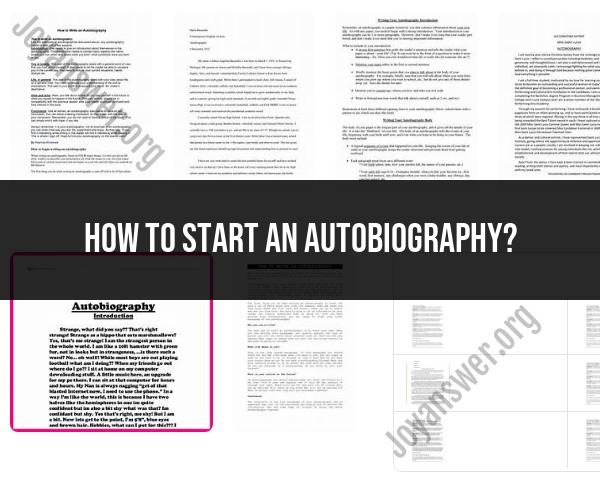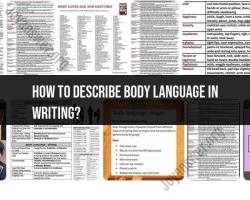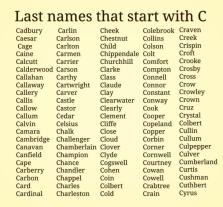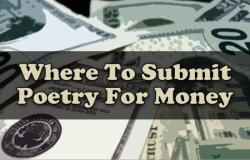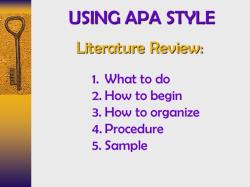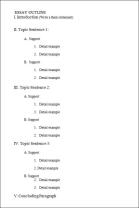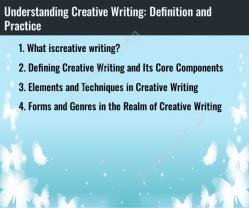How to start an autobiography?
Starting an autobiography can be an exciting yet challenging endeavor. Here are some steps to help you get started:
1. Reflect on Your Life:
- Take some time to reflect on your life experiences, significant moments, achievements, challenges, and influential people. Consider your childhood, family, education, career, passions, and pivotal events.
2. Identify a Theme or Focus:
- Decide on a theme, focus, or message you want to convey through your autobiography. It could revolve around personal growth, overcoming obstacles, lessons learned, or a specific period of your life.
3. Choose a Starting Point:
- Determine where you want to begin your story. It could be a memorable event, a turning point, or the beginning of your journey.
4. Develop an Outline:
- Create a rough outline or structure for your autobiography. Consider organizing it chronologically or thematically based on the focus of your story.
5. Write a Compelling Introduction:
- Start with an engaging introduction that hooks the reader. You might begin with a captivating anecdote, a pivotal moment, or a reflection that sets the tone for your autobiography.
6. Write Freely:
- Start writing freely without worrying too much about perfection in the initial draft. Write down your memories, experiences, and thoughts as they come to mind.
7. Use Vivid Details:
- Use descriptive language to paint a vivid picture for your readers. Describe places, people, emotions, and events in a way that makes your story come alive.
8. Be Honest and Authentic:
- Be honest and authentic in sharing your experiences, emotions, and perspectives. Authenticity adds depth and resonance to your autobiography.
9. Edit and Revise:
- After writing, revise and edit your work. Polish your writing by checking for grammar, spelling, and coherence. Ensure your narrative flows smoothly and is easy to follow.
10. Seek Feedback:
- Share your draft with trusted friends, family, or writing groups for feedback. Constructive feedback can help improve your autobiography and provide different perspectives.
11. Continue Writing and Refining:
- Writing an autobiography is a continuous process. Keep writing, revising, and refining your story as you recall more memories or gain new insights.
Remember, there's no right or wrong way to start your autobiography. Let your unique voice and experiences shine through, and enjoy the process of telling your life story!
1. How to Commence Writing an Autobiography
Embarking on an autobiography is an exciting journey of self-reflection and personal storytelling. It's an opportunity to encapsulate your life's experiences, share your unique perspective, and leave a lasting legacy. To effectively commence writing your autobiography, follow these steps:
Gather Your Memories: Take some time to reminisce about your life's journey. Jot down significant events, pivotal moments, people who have influenced you, and experiences that have shaped your personality.
Organize Your Thoughts: Create a rough outline of your autobiography. Divide your life into stages, such as childhood, education, career, personal relationships, and significant achievements. This will help you structure your narrative and ensure a cohesive flow.
Choose a Starting Point: Decide where you want to begin your narrative. You can start from your earliest memories, a defining moment in your life, or a significant transition, such as starting a new chapter or reaching a milestone.
Establish Your Voice and Style: Consider how you want to present your story. Will you use a formal or casual tone? Will you write in the first person or incorporate third-person perspectives? Find your authentic voice and let your personality shine through your writing.
2. Strategies for Starting an Autobiography Effectively
An engaging introduction is crucial for captivating your readers and setting the tone for your autobiography. Here are some strategies to effectively start your autobiography:
Grab Attention with a Vivid Anecdote: Share a personal experience that highlights your character, values, or passions. It could be a humorous incident, a moment of overcoming adversity, or a defining realization.
Pose a Thought-provoking Question: Intrigue the reader with a question that reflects your journey of self-discovery or a challenge you've overcome. This question could serve as the underlying theme of your autobiography.
Use Figurative Language and Sensory Details: Paint a picture with descriptive language and sensory details to bring your memories to life. Let the reader experience the sights, sounds, smells, tastes, and textures of your experiences.
Introduce a Significant Person or Influence: Share how a person or event has shaped your life and influenced your journey. Describe their impact on your decisions, beliefs, or personal growth.
Reveal a Personal Goal or Aspiration: Hint at your hopes and dreams for the future, setting the stage for your personal growth narrative. This will pique the reader's interest and encourage them to follow along as you unfold your story.
3. Recommended Introductory Approaches for an Autobiography
Here are some recommended introductory approaches for your autobiography:
Chronological Start: Begin with your earliest memories and chronologically narrate your life's events, providing context and depth to each stage.
Thematic Start: Choose a central theme, such as resilience, transformation, or self-discovery, and weave your experiences around this theme, highlighting how they shaped your perspective.
Memorable Moment Start: Open with a vivid and impactful moment that defines a turning point in your life and sets the stage for your narrative.
Quote or Reflection Start: Begin with a personal quote or reflection that captures the essence of your life's journey and sets the tone for your autobiography.
Question or Challenge Start: Pose a thought-provoking question or challenge that you faced, and use your autobiography to explore your journey of overcoming it.
